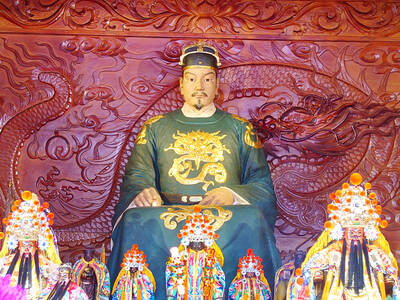You know how it is to yearn for a dish with a distinctive taste and nothing else will satisfy.
This was the case a few weeks ago in Ximending when the unmistakable smell of sesame oil chicken soup wafted up to the 11th floor. It was lunchtime so we looked around but found no restaurants in the area that served this traditional Taiwanese offering.
It turned out the only place you could buy the meal locally was at 7-Eleven, where you have to order two days in advance. It's not bad if you like your food microwaved and served in a plastic container, but Lung Hsian Chu in bustling Yongkang Street is much better.

PHOTO: JULES QUARTLY, TAIPEI TIMES
The Taiwanese version of sesame oil chicken uses stock boosted by various herbs. The result is a dish reeking of sesame that is served up in an earthenware chafing pot. It's simple but effective and goes best with plain rice and an order of vegetables.
Other chicken dishes on offer includes chicken with heshouwu (
The poultry ranges from the cheapest, regular chicken (NT$110), to free-range chicken (NT$140) and finally black-skinned chicken (NT$160) -- which is said to be the best of the lot.
The adventurous may want to try some of the side dishes, which include sesame oil dried blood, dried cured tofu, or fragrant soft eggs. Wash it all down with the honeyed green tea or plum juice.
Lung Hsian Chu is a pleasant two-story restaurant with around 25 tables that's been open for a year-and-a-half. It's popular among students and local mothers who pop in for a takeaway to put on the table for the family's evening meal.
The decor is unassuming with dark wooden tables and white paper lanterns, large Japanese colonial-era windows and bare walls. The wait staff are reasonably helpful and friendly when you get to know them.
This is unpretentious eating and the Taiwanese version of chicken soup that is good for the soul. A meal at Lung Hsian Chu more than fills the gap, as it also delivers a healthy dose of Chinese medicine.

On a harsh winter afternoon last month, 2,000 protesters marched and chanted slogans such as “CCP out” and “Korea for Koreans” in Seoul’s popular Gangnam District. Participants — mostly students — wore caps printed with the Chinese characters for “exterminate communism” (滅共) and held banners reading “Heaven will destroy the Chinese Communist Party” (天滅中共). During the march, Park Jun-young, the leader of the protest organizer “Free University,” a conservative youth movement, who was on a hunger strike, collapsed after delivering a speech in sub-zero temperatures and was later hospitalized. Several protesters shaved their heads at the end of the demonstration. A

In August of 1949 American journalist Darrell Berrigan toured occupied Formosa and on Aug. 13 published “Should We Grab Formosa?” in the Saturday Evening Post. Berrigan, cataloguing the numerous horrors of corruption and looting the occupying Republic of China (ROC) was inflicting on the locals, advocated outright annexation of Taiwan by the US. He contended the islanders would welcome that. Berrigan also observed that the islanders were planning another revolt, and wrote of their “island nationalism.” The US position on Taiwan was well known there, and islanders, he said, had told him of US official statements that Taiwan had not

The term “pirates” as used in Asia was a European term that, as scholar of Asian pirate history Robert J. Antony has observed, became globalized during the European colonial era. Indeed, European colonial administrators often contemptuously dismissed entire Asian peoples or polities as “pirates,” a term that in practice meant raiders not sanctioned by any European state. For example, an image of the American punitive action against the indigenous people in 1867 was styled in Harper’s Weekly as “Attack of United States Marines and Sailors on the pirates of the island of Formosa, East Indies.” The status of such raiders in

As much as I’m a mountain person, I have to admit that the ocean has a singular power to clear my head. The rhythmic push and pull of the waves is profoundly restorative. I’ve found that fixing my gaze on the horizon quickly shifts my mental gearbox into neutral. I’m not alone in savoring this kind of natural therapy, of course. Several locations along Taiwan’s coast — Shalun Beach (沙崙海水浴場) near Tamsui and Cisingtan (七星潭) in Hualien are two of the most famous — regularly draw crowds of sightseers. If you want to contemplate the vastness of the ocean in true